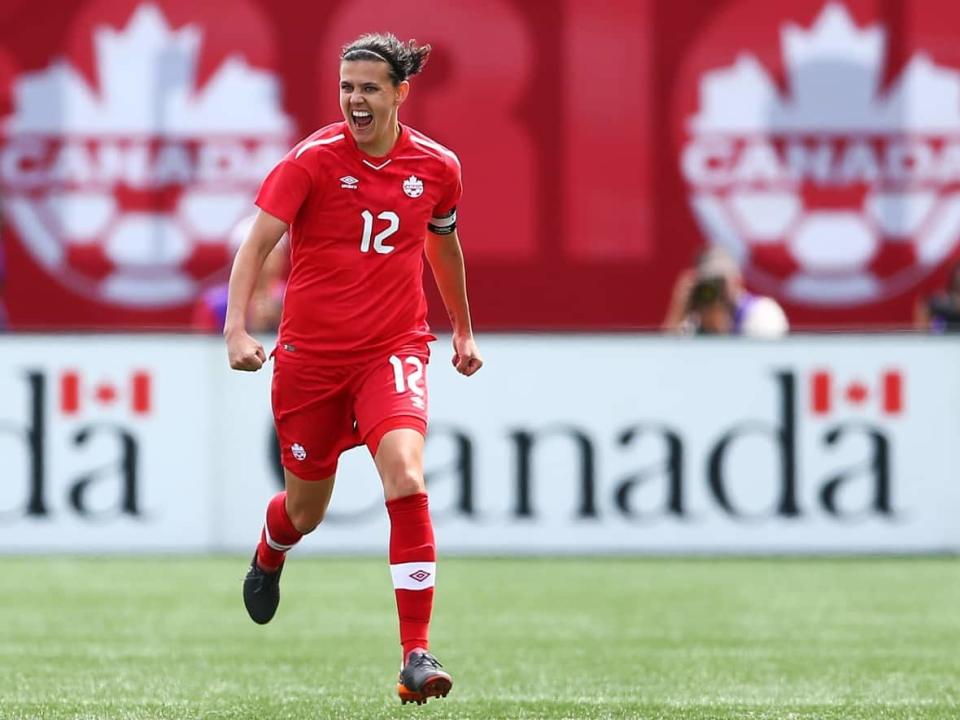From 'obnoxious' U.S. team to life-changing coaches, Canadian soccer icon Sinclair opens up in memoir

Ask Christine Sinclair where she'd most love to be and the answer will most likely be home or spending quality time with family somewhere, perhaps an intense ping-pong battle with her brother Michael or taking her two nieces to Vancouver's Grouse Mountain around Christmas time.
Slightly further down the list will be her teammates and coaches. Whether it be as a youth when she was just realizing her passion for soccer, those at the University of Portland with whom she won two national championships, members of the Portland Thorns with whom she just won her third NWSL title this past Saturday, or the compatriots with whom she's battled with for Team Canada across more than two decades.
Soccer's greatest international goal scorer is a shy and intensely private person who loves the sport. It should come as no surprise that her first memoir, 'Playing the Long Game' — co-written with Canadian sports journalist Stephen Brunt — is scripted with a greater purpose than looking back on her remarkable life and telling only her story.
"I wouldn't be where I am if it wasn't for my family, my friends, my teammates," Sinclair told CBC Sports. "My journey in and of itself would be pretty boring [without the people who have helped me]."
Over the course of this captivatingly honest read that's currently available at bookstores across Canada, Sinclair details the sacrifices her parents and extended family made to give her the opportunities she needed to be recognized in a country that still lacks the infrastructure to spot women's talent at an adequate level.
Sinclair touches on the highs and lows of playing sport at the highest level, including the devastating 2012 Olympic defeat to the U.S. in the semifinals and winning gold at Tokyo 2020, and what it means to be a woman in sport and the ongoing fight to be treated equally.
WATCH | Soccer North Ep. 2: Can Canada get out of group stage at men's World Cup?
Hilariously, Sinclair's honesty also sees some shots fired — some tongue-in-cheek and others not so much — among them the American women's team having an attitude that is "just so obnoxious," as well as attributing Italian doctors who tended to her thinking she was crazy to play through a broken nose at the 2011 FIFA Women's World Cup, among other anecdotes.
Whether it was the Canadian women's team's rise from "little sister" to contender, or her mother Sandi's battle with multiple sclerosis and her dad Bill doing everything in his power to care for her, fighting spirit plays a crucial theme throughout the book.
As she looks ahead to what's next, her passion to keep fighting and make the most of her platform in her own way is evident, whether it be raising awareness for her mother's disease or furthering the women's game.
WATCH | Sinclair leads Canada to Olympic gold:
"My mom fought her whole life and taught me to never give up," Sinclair said. "She taught me that if you want things to be better, you have to go out and try and do it yourself. I'm lucky to play a team sport so I have a lot of teammates around as well.
"I think it's partially also just, in Canada, it's in our DNA. Especially the women's game when I first joined the national team, we were always the underdogs ... We're a gritty bunch that don't know when we should stop."
Among the more fascinating sections of the book are, expectedly, the importance of John Herdman to the program; Sinclair credits him with being "the best coach I've ever had."
WATCH | Sinclair scores 190th international goal:
Herdman wasn't the only national coach who received a huge amount of credit though, with the other being Even Pellerud, who gave Sinclair her first opportunity with the national team and was with the team from 1999 to 2008. The two keep in touch to this day.
"Even was the man that turned the program around and gave it its first jumpstart," Sinclair said. "He demanded funding from the federation, demanded international games, and support. The team had done very poorly in the 1999 World Cup and when he came on board he built the team for the future."
Need for professional league in Canada
As far as Canada women's soccer has come with winning a gold medal at the Olympics and several players playing professionally in Europe, Sinclair warns of what may be if the country isn't proactive in capitalizing on this very moment.
"The fact that we don't have a professional league is, quite frankly, embarrassing," Sinclair said. "I fear for the future of our women's team if we don't have a league because players get passed by and overlooked, it's scary.
"You see all these other countries investing such large amounts of money and time and energy into the professional game like England and Spain."
Sinclair promises to stay involved in soccer in some capacity, although the role of a head coach or general manager has zero appeal to her. Unlike Serena Williams or Roger Federer, she isn't looking for a big farewell and would much rather slip through the backdoor. Even if she's living a quiet life somewhere in Portland, expect the fire to burn bright.
This is one of the most unassuming superstars you'll ever come across, and her story of going from a kid from Burnaby, B.C., to one of the greatest to ever do it is special because she has nothing but time for the people who helped and stood alongside her every step of the way.
Oh, and she hopes her American friends still like her.

 Yahoo Sports
Yahoo Sports 
